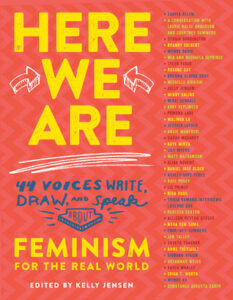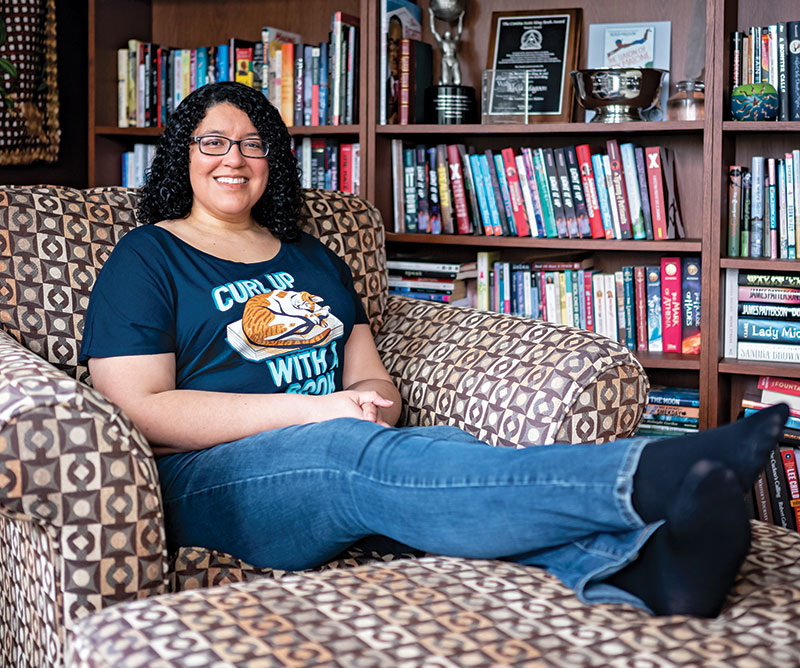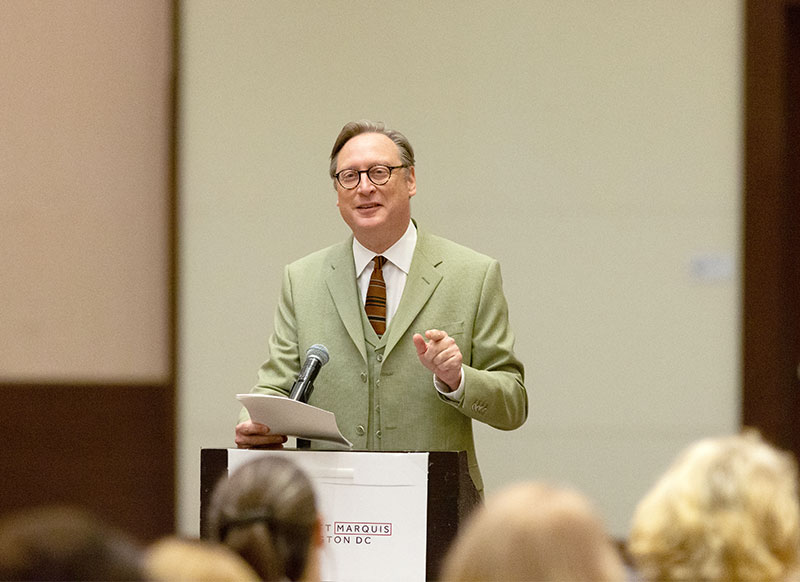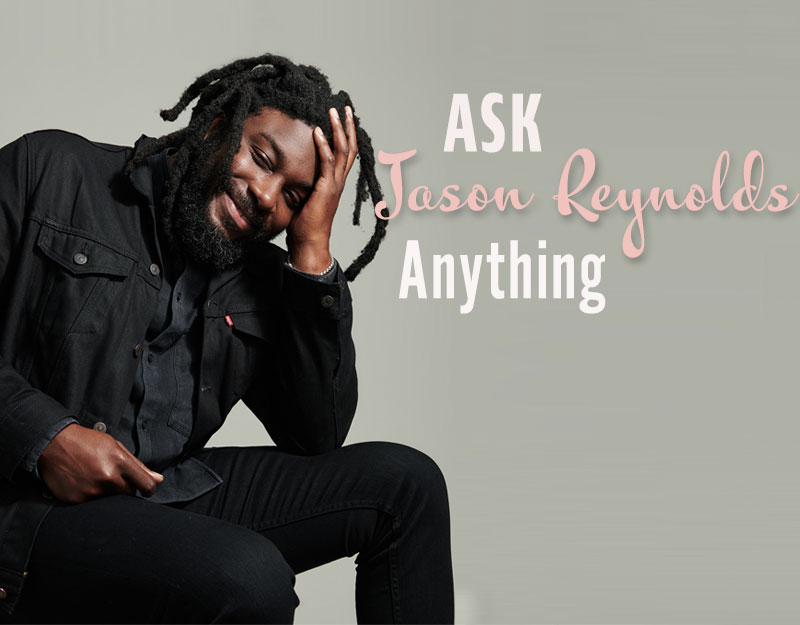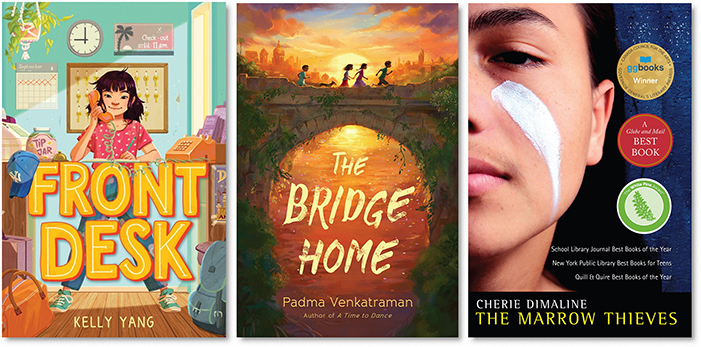Here We Are: Feminism for the Real World – Kelly Jensen talks with contributor Alida Nugent about social justice, feminism & finding and using your voice
It’s day two of our week celebrating the release of Here We Are: Feminism for the Real World edited by Kelly Jensen. Today, Kelly joins us as she interviews one of the contributors, Alida Nugent. Be sure to visit our post from day one to enter to win a Feminist t-shirt!
“I’ve become the kind of person I never used to like at parties”: Alida Nugent on Feminism
____________________
One of the reasons I reached out to Alida Nugent about contributing to Here We Are: Feminism For The Real World was my quick love for the way she infuses humor into her writing (which, spoiler, means you need to pick up her books if you haven’t yet!–and yes, they’re teen appropriate). Her essay, “Pretty Enough,” conveys a sharp sense of humor but not to the detriment of the point she makes in the piece. As a biracial girl growing up in a community with beautiful (white) girls, she felt she stood out. It wasn’t until a trip to Puerto Rico, where she came face-to-face with all kinds of people who looked like her, that she learned not to simply accept her looks, but to embrace the cultural history and richness she wears every single day.
ADVERTISEMENT
ADVERTISEMENT
Here’s a short excerpt from her essay:
In my teenaged years, I experienced the curiously affectionate friendships of girls who didn’t really understand me. They would tan in the sun after weeks spent at resorts in Jamaica or Mexico, returning to place their fading arms next to mine to compare our color. They would casually mention how dark the hair on my arms was. They would straighten my hair for me, which then “looked much better.” I would pluck my eyebrows in the middle. I would smile in every picture, even as I tried to hide my stomach and grow- ing breasts; while my friends were growing upward, I was growing outward. And if, like the Sesame Street song, one thing was not like the other, surely I was the one thing that did not belong.
But man, did I try. I dressed like them. I bought the perfumes they did. I borrowed their phrases and mannerisms. I almost looked like them. But I really didn’t. I was darker, and heavier, and different. I could roll my r’s. I danced to salsa with my grandmother. I had odd ingredients in my kitchen like achiote seeds and sofrito paste from the mostly untouched international foods section of my local grocery store. I loved these girls because they were nice to me, and I loved them because they had freckles and rosy cheeks and all the other things I thought were beautiful. But we were different, and I couldn’t shake it.
“Where are you from again?” They asked me this sometimes.
“The rain forest,” I would say. And my dad is from the Bronx, I would think.
There’s no question that one of the issues feminism confronts is beauty and the enormous standards placed upon girls and women especially in our culture. From a social justice standpoint, Alida’s essay also confronts the white norms of beauty—thin, with a small nose, with skin that tans well—and the norms of having a house full of “normal” spices and foods and language that doesn’t have a musical lilt to it.
Kelly Jensen: If you had to pick a moment that really defined you as a feminist, where you felt like owning the term, what was that moment?
Alida Nugent: I think as I got older, and I started to really examine some of the harmful rhetoric that I learned when I was in high school and early college, when I stopped looking at women as competition for every job and man and position–that was the start to my feminism. Looking at women as allies instead of enemies. And if there was an exact moment, it was probably when I went on birth control. Birth control was so stigmatized, and all it did was cure the debilitating cramps I used to get every month. I thought: This is what they’re demonizing? This is what people are trying to take away access to? What else are they trying to do? And it became simple to me.
Kelly: How and why do you use humor to cut into issues of feminism and social justice? What effect do you think that has for those who aren’t sold on the concept and perhaps for those that do “get” it but haven’t yet owned it?
Alida: I’ve always, always, always approached things with a joke and a smile. I learned when I was younger how easily it disarmed people. I was made fun of in high school for my physical appearance, and when I learned to be funnier than all those bullies (because bullies are never funny), I felt like I got a head start during the race. And I still feel that way: you’d be surprised how hard it is to insult somebody who made a solid joke. It’s worked for me. And another benefit: it creates a comfort for people. Laughing is a comfort. So if you’re trying to get people to see your side, a good joke is going to relax them enough to listen to you, to put down their wall and really listen. Jokes are powerful, and they can be used for good and they can be used for bad. I try to use them for good.
Kelly: In what ways have you incorporated social justice/feminism into your everyday life?
Alida: I’m loud. I think I’ve become the kind of person I never used to like at parties—I call people out for the stupid or harmful or ignorant things they say. It’s not always easy, and it’s not always well-received, but I don’t want to be one of those people who smiles at a “KIND OF” sexist joke because I don’t want to start something. Now, I always want to start something. It’s serious to me. And I read. I read everything and try to learn everything, so I always know exactly what is going on in the world.
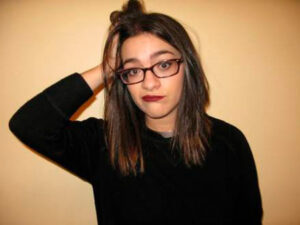
Kelly: One thing I learned about you recently is that you are a teen librarian. Can you talk a bit about the ways your perspective as a feminist/advocate for social justice have intersected with your career?
Alida: So this is kind of funny. When you said “teen librarian” I thought you meant it literally—I was a librarian in my teens! And I’m going to take that embarrassment and turn it into a real answer, because being that teen librarian did launch me to exactly where I am today. It was when I first started reading all these books in the corner of my suburban library that I started seeing…and not seeing….what kind of books were really out there. I very rarely read a book about a girl like me. I always read about beautiful white skinny quirky girls who were quirky because they read books, just like I read books, except I wasn’t like them at all. And it stuck with me. Either those books aren’t getting published or they’re not getting put in libraries. And I wanted to be the voice for the kinds of girls that were missing in those books. I was a fleshy Puerto Rican Irish girl with thick arm hair. I wanted to be in books, too. And as I get older, it’s why I’m so honest about my opinions. My former eating disorder. My history. My recognition of all kinds of girls—the girls you don’t always read about. When I write now, I keep that in mind. I keep in mind that someone might pick up my book and go “well, there I am.” And I do my absolute best to honor that.
Kelly: What are some of your favorite books and/or resources that would benefit all readers eager and curious about social justice/feminism?
Alida: Janet Mock’s autobiography Redefining Realness changed me, I always tell people to read that one. And Bad Feminist, of course. But if you’re really curious about social justice and feminism, follow every journalist and writer and advocate you see on their social media platforms. Twitter can be problematic in many ways, but one of the best ways to combat that is to fill your timeline up with all kinds of different perspectives: feminist, trans, POC, those who do not fall into the gender binary, different religions, etc. Learn about what they say and write about. Listen to them and their fears and concerns. Immerse yourself with people outside your bubble.
ADVERTISEMENT
ADVERTISEMENT
Kelly: How can young readers and those who advocate on their behalf better prepare themselves to be actively engaged with social justice and feminism? How can we better make people feel like they belong in their own bodies and in their own homes, despite what the immediate space around them might look like?
Alida: Find your voice. Learn to use it. Learn that people won’t always want to hear it. Speak anyway. Learn from your mistakes. Apologize when you need to. Stand your ground on things you feel you weren’t wrong about. Learn. Try, and try again. But mostly, keep speaking, because your voice is unique and precious and deserves to be out there.
Kelly: What is the biggest thing you hope readers take away from your essay in Here We Are?
Alida: That it’s okay to feel beautiful. That your history is rich and wonderful. And in those moments that you feel ugly, you have to remember that while you’re smart, you’re not always right!
Meet Alida Nugent
Alida Nugent is the author of Don’t Worry, It Gets Worse, and You Don’t Have to Like Me, available wherever books are sold. She lives in Brooklyn, where she gets lipstick on all her bagels, and writes at The-Frenemy.com.
Filed under: #SJYALit
About Karen Jensen, MLS
Karen Jensen has been a Teen Services Librarian for almost 30 years. She created TLT in 2011 and is the co-editor of The Whole Library Handbook: Teen Services with Heather Booth (ALA Editions, 2014).
ADVERTISEMENT
ADVERTISEMENT
SLJ Blog Network
At Last! Mr. Schu on The Yarn Podcast
Fuse 8 n’ Kate: Ginger Bear by Mini Grey
Team Unihorn and Woolly | This Week’s Comics
Parsing Religion in Public Schools
ADVERTISEMENT


